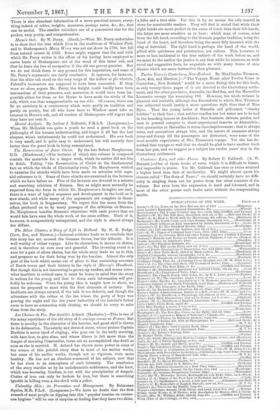Herne's Oak. By W. Perry. (Booth.)—What Mr. Perry undertakes is
to show that the tree which lives in the traditions of Windsor Park and in Shakespeare's Merry IVives was not cut down in 1796, but fell from natural causes in 1863. Some might suggest that the zeal with which Mr. Perry writes is the effect of his having been employed to carve busts of Shakespeare out of the wood of this latter oak, and that he fears the loss of occupation if the old one proves genuine. But we do not think there is any ground for this imputation, and some of Mr. Perry's arguments are fairly conclusive. It appears, for instance, that the older oak stood on the very verge of the hollow or pit wherein FaIstafra tormentors are supposed to have been concealed. If they were so close, argues Mr. Perry, the knight could hardly have been unconscious of their presence, and, moreover, it would have been im- possible either for them or for Herne to have made the circle of the
oak, which was thus unapproachable on one side. Of course, there can be no certainty in a controversy which rests partly on tradition and partly on poetry, but all who have been to Windsor must take an interest in Herne's oak, and all readers of Shakespeare will regret that they have not seen it.






























 Previous page
Previous page